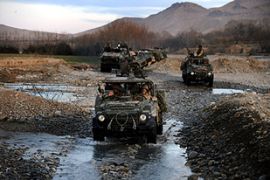Dutch mission ends in Afghanistan
Roughly 2,000 troops to leave on schedule despite request to stay from Nato.

‘Successful’ mission
The majority of Dutch troops in Afghanistan were deployed in the country’s southern Uruzgan province, where they implemented a “whole of government” strategy called the “3D” approach for its focus on development, diplomacy and defence.
|
Al Jazeera’s James Bays reports from Kabul where Dutch troops are ending their mission |
The plan garnered positive media attention and a favourable view from Barack Obama, the US president, who called the Dutch mission “one of the most outstanding” in Afghanistan.
Access to education and health care improved under Dutch oversight, but a lack of dependable energy and security still hampered the province in 2009, according to one reportby the Liaison Office, a non-governmental organisation in Afghanistan.
The Dutch troops were also unable to substantially reduce the production of poppy, and doubts among the populace about the Afghan government’s ability to provide services in the absence of foreign help persisted, according to the report.
Brigadier-General Van De Heuvel, the commander of Dutch forces in Afghanistan, told Al Jazeera: “I’m proud of the Netherlands being four years here in Uruzgan province but on the other hand I feel sad to leave. There is a lot to be done but I am happy to be handing over to our successors and I am very trustful they will carry on the same way we did.
“I think it was a combination of security, development and governance that defined our approach there and as far as I can see, it worked very well.”
No ink spot
The Dutch were part of a Nato effort to set up secure zones in southern Afghanistan and expand them like “ink spots”.
But four years on, Al Jazeera’s James Bays reports, that ink spot does not extend far beyond the main Dutch base.
“People’s anticipations were not met during their stay, people had hoped that security, reconstruction, and development will be established,” Mohammed Hashim Watanwal, a member of parliament from Uruzgan, told Al Jazeera.
“Unfortunately I would like to say … the Dutch have not given sufficient attention to this province”.
Canadian troops who make up the majority of Nato forces in neighbouring Kandahar province are scheduled to begin coming home next year, and the departure of the Dutch is likely being closely watched by other European nations, our correspondent said.
The coming drawdown of foreign forces – the United States is also set to begin reducing troop levels next year – makes Afghans themselves wonder about the international commitment to their country, according to our correspondent.
“You speak to ordinary Afghans, and it adds to the perception … they think that Nato is not here for the long term, that Nato forces will soon withdraw, even American forces will soon withdraw,” Al Jazeera’s correspondent said.
Many believe that “it’s possible the Taliban will be back.”